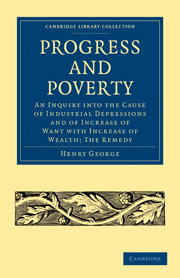 Progress and Poverty
Progress and Poverty Book contents
- Frontmatter
- PREFACE TO FOURTH EDITION
- Contents
- INTRODUCTORY
- BOOK I WAGES AND CAPITAL
- BOOK II POPULATION AND SUBSISTENCE
- BOOK III THE LAWS OF DISTRIBUTION
- Chapter I The inquiry narrowed to the laws of distribution—necessary relation of these laws
- Chapter II Rent and the law of rent
- Chapter III Interest and the cause of interest
- Chapter IV Of spurious capital and of profits often mistaken for interest
- Chapter V The law of interest
- Chapter VI Wages and the law of wages
- Chapter VII Correlation and co-ordination of these laws
- Chapter VIII The statics of the problem thus explained
- BOOK IV EFFECT OF MATERIAL PROGRESS UPON THE DISTRIBUTION OF WEALTH
- BOOK V THE PROBLEM SOLVED
- BOOK VI THE REMEDY
- BOOK VII JUSTICE OF THE REMEDY
- BOOK VIII APPLICATION OF THE REMEDY
- BOOK IX EFFECTS OF THE REMEDY
- BOOK X THE LAW OF HUMAN PROGRESS
- CONCLUSION
- INDEX
Chapter I - The inquiry narrowed to the laws of distribution—necessary relation of these laws
Published online by Cambridge University Press: 07 September 2011
- Frontmatter
- PREFACE TO FOURTH EDITION
- Contents
- INTRODUCTORY
- BOOK I WAGES AND CAPITAL
- BOOK II POPULATION AND SUBSISTENCE
- BOOK III THE LAWS OF DISTRIBUTION
- Chapter I The inquiry narrowed to the laws of distribution—necessary relation of these laws
- Chapter II Rent and the law of rent
- Chapter III Interest and the cause of interest
- Chapter IV Of spurious capital and of profits often mistaken for interest
- Chapter V The law of interest
- Chapter VI Wages and the law of wages
- Chapter VII Correlation and co-ordination of these laws
- Chapter VIII The statics of the problem thus explained
- BOOK IV EFFECT OF MATERIAL PROGRESS UPON THE DISTRIBUTION OF WEALTH
- BOOK V THE PROBLEM SOLVED
- BOOK VI THE REMEDY
- BOOK VII JUSTICE OF THE REMEDY
- BOOK VIII APPLICATION OF THE REMEDY
- BOOK IX EFFECTS OF THE REMEDY
- BOOK X THE LAW OF HUMAN PROGRESS
- CONCLUSION
- INDEX
Summary
The preceding examination has, I think, conclusively shown that the explanation currently given, in the name of political economy, of the problem we are attempting to solve, is no explanation at all.
That with material progress wages fail to increase, but rather tend to decrease, cannot be explained by the theory that the increase of laborers constantly tends to divide into smaller portions the capital sum from which wages are paid. For, as we have seen, wages do not come from capital, but are the direct produce of labor. Each productive laborer, as he works, creates his wages, and with every additional laborer there is an addition to the true wages fund—an addition to the common stock of wealth, which, generally speaking, is considerably greater than the amount he draws in wages.
Nor, yet, can it be explained by the theory that nature yields less to the increasing drafts which an increasing population make upon her; for the increased efficiency of labor makes the progressive state a state of continually increasing production per capita, and the countries of densest population, other things being equal, are always the countries of greatest wealth.
So far, we have only increased the perplexities of the problem. We have overthrown a theory which did, in some sort of fashion, explain existing facts; but in doing so have only made existing facts seem more inexplicable.
- Type
- Chapter
- Information
- Progress and PovertyAn Inquiry into the Cause of Industrial Depressions and of Increase of Want with Increase of Wealth; The Remedy, pp. 137 - 147Publisher: Cambridge University PressPrint publication year: 2009First published in: 1881
